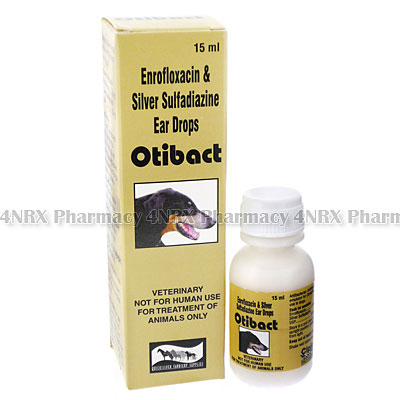 |
Home  4NRX Pet Pharmacy 4NRX Pet Pharmacy  Otibact Ear Drops (Enrofloxacin/Silver Sulfadiazine) Otibact Ear Drops (Enrofloxacin/Silver Sulfadiazine) |
|
|||||||||
|
Otibact Ear Drops (Enrofloxacin/Silver Sulfadiazine)
What is Otibact Ear Drops (Enrofloxacin/Silver Sulfadiazine) used for? Otibact Ear Drops (Enrofloxacin/Silver Sulfadiazine) contain two active ingredients, both of which are antibiotics. The active ingredient silver sulfadiazine is also effective in preventing yeast from growing on damaged skin. These ear drops are effective in treating ear infections in dogs caused by bacteria or fungi, and work by fighting the bacteria or fungi responsible for causing the infection. How should I use Otibact Ear Drops (Enrofloxacin/Silver Sulfadiazine)? Before you apply Otibact Ear Drops (Enrofloxacin/Silver Sulfadiazine) to your dog's ear, you should clean its ear with a suitable ear cleaning solution, and remove any debris. You may then apply the prescribed amount of drops to the affected ear or ears of your dog, and gently massage the ear. This will help to ensure that the medication is evenly distributed throughout the ear. Owners are sometimes told to apply 5 to 10 drops each time to dogs that weigh 35lbs or less. Dogs weighing more than this may require 10 to 15 drops each time. The vet may also tell you to apply these ear drops twice per day for up to 14 days. What are the side effects of Otibact Ear Drops (Enrofloxacin/Silver Sulfadiazine)? Otibact Ear Drops (Enrofloxacin/Silver Sulfadiazine) may possibly cause problems with balance in dogs, redness of the ear or loss of hearing. This product may cause problems with the development of bones in young dogs, such as those under 24 months. Only use it on young animals if a vet has told you to. Dogs with central nervous system disorders may be at risk of seizures as a result of treatment with these ear drops. Please Note These ear drops are for use on animals, and should never be used on humans. Strictly follow all instructions provided to you by the prescribing vet while using Otibact Ear Drops (Enrofloxacin/Silver Sulfadiazine) on your dog. Optimum and safe dosage can differ based on the dog and the condition it is being treated for. As this medication may be unsafe for certain dogs, it is essential you always inform the vet if your dog is used for breeding and is pregnant or lactating, as well as if it has any allergies, other illnesses, or ongoing health conditions, and if it is being given any other form of medication, supplements, or herbal products. Immediately seek emergency veterinary care if your dog has any allergic or hypersensitive reaction. Common signs of a reaction in dogs include hives, swelling, skin rashes, chest pains, as well as trouble breathing or swallowing. 
|
|||||||||||||||||